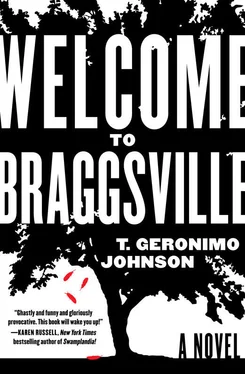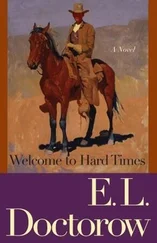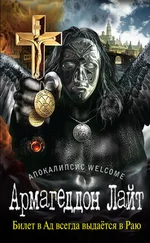Savannah (’77–’78, ’82, ’84, ’85) and Augusta (’79–’80, ’81–’82, ’83, ’84, ’86–’96) had between them freely shared the honor on several occasions, like a toffee stick growing shorter by the minute (had not Augusta been the epicenter of the Yazoo fiasco?), then Louisville (named after a Frenchman and populated by only 550, half of whom were slaves?), and finally Milledgeville (where they hadn’t even the foresight to complete construction in time to hold the first assembly?). It was August 1830. The natives were peacefully relocated to Oklahoma, and the land prices once more stable, in no small part because of the valor of men like Bragg and Jackson. If the shifting winds could be caught just right, like that moment when fish school, why then — why, why, why — couldn’t this very spot where Bragg laid claim, these fecund twenty-five thousand acres of sweet-smelling pine and clover, ripe for cotton and timber harvesting and a mill, be the next capital?
BECAUSE ALONG ITS SOUTHERNMOST BORDER LAY an inexplicable depression some called the Devil’s Footprint and others Pasco Holler, and all agreed was haunted. For proof they needed only regard their own history: Bragg’s caravan lost there for days like a schooner listless, adrift without anchor or sail — while his missus, gripped in a stupor by the nameless illness that befell her, the old folk claimed, the very second the very first Pasco tree dropped shadow on them — lay wasting away in the carriage, quarantined from even her three young sons, giving up the ghost just as they escaped the cruciferous canopy that had played day for night the better part of a week. Murmurs about a curse, a murder, a lone Indian left behind to guard the wood, an enchanted elm, but these were never mentioned out loud. The widower’s gray face cast doubt on all unfavorable speculation. Himself sick with grief, Bragg ventured little farther than the hill beyond that tree line. There where the Oconee forked in sight of the Holler, he laid his wife to rest in the center of what would become known as Braggsville, the city that love built in the heart of Georgia.
He erected a watchtower on that spot, and there strode imperial, overseeing the construction of his lumber mill, pacing the platform. The moon was always full in Braggsville. Shine during Prohibition, cotton when it was king, real estate and livestock during the Great Depression, hemp during the bull scare, an ordnance mill during the First World War: the town never fell prey to the capricious economic tides buffeting the rest of the country, and the colored folks liked it, too. They even had their own quarter, the Gully, and their own currency. (Except Nanny Tag, who wet-nursed Bragg’s three boys, and so was given room and board by Bragg, and was paid in cash by the superstitious townfolk for whom she performed certain favors.)
The currency was called Nigger-head, and it couldn’t be traded for a real penny, but it had value nonetheless. All services a colored man rendered in good faith to a white man to whom he was not legally bound were rewarded with a Nigger-head that could be exchanged for various goods at the side window of Mrs. Lee’s General and Feed.
Bragg never failed to share this fact with the state legislature when petitioning for Braggsville’s rightful recognition as the political center of the state. He redoubled his efforts after the Civil War, that second revolution, which saw Atlanta deservedly burned to her curbs, while Braggsville, where they had the foresight to dismantle their machinery, remained largely untouched because it appeared to the Union detachments to be, for all intents and purposes, decrepit. Inspecting the mill, the machinery in shambles and scattered about the floor, one Union general was reported to have said, They ought to stick to farming.
The drums and handlers and frame saws all tucked away in the Holler, the mill was back in service within two weeks after the shameful incident at Appomattox and was for several months one of the few operational industrial centers in the South. Bragg again petitioned the state, inviting the Milledgeville legislators to Braggsville to tour the mill, admire the town square centered around the watchtower, itself ringed with smiling azaleas, and enjoy a brief reenactment of the decisive battle in which the local men had figured prominently in humiliating the Yankee forces. He greeted the envoy wearing the boots he’d worn in campaigns with Old Hickory himself, by then known more roundly as the Hero of New Orleans for his instrumental role in suppressing a coup. A new courthouse was constructed (now a Circle K convenience store), the main streets widened, and the railroad station expanded to become the first two-story in the state, complete with a sitting room from which gentlemen could view the incoming trains. The government responded by selecting as capital a town once known merely as Terminus because it was there that the railway ended, then Marthasville — in honor of the governor’s daughter — and finally Atlanta, because the tracks would eventually run from the Atlantic (east 364 miles) to the Pacific (west 2,180 miles). Raymond Bragg redoubled his efforts by redoubling the reenactment in size and frequency, but he died in 1885, childless (his three sons killed in the Battle of Atlanta), without seeing Braggsville accorded the honor it deserved, and before, Fortunately, said all, seeing the mill eaten to ash when a rogue boll weevil broke ranks and ate the insulation out of an already faulty circuit breaker. The reenactments ended soon after. They started once more, unfortunately, when Georgia again raised the Confederate battle flag in 1956, the same year the state legislature passed bills rejecting Brown v. Board of Education . But they have nothing to do with slavery, secession, or segregation. It’s only civic pride.
DARON HAD HEARD IT ALL BEFORE, except the part about the Nigger-head and the reenactments coming back with the flag. He’d thought they’d always been part of the town. His mother told the story for Charlie’s benefit (as they picked at his mom’s famous French toast, finally removed from the No Fly List), explaining that Charlie was wise not to get involved because it didn’t have anything to do with him. Daron listened patiently, and though the currency issue deserved further investigation, he asked no questions so as not to encourage her. She was already angry, as was his father, who was at that moment driving out to Old Man Donner’s land.
As long as Daron could remember, the mill ran at half capacity on the day of the reenactment, operated mostly by folks from the Gully and the few townies who picked short straws. His father, though, worked that day every year. To his family, he explained it as time-and-a-half. To his coworkers he said, It’s not good and smoky until nearly four, when the battle climaxes. Strange thing was his father never was at the field by four, or at all, as a matter of fact. This morning, though, when Daron and Charlie returned from dropping off Louis and Candice, he was sitting in the living room, and wasn’t even dressed for work. He’d taken the day off because his son was in town, had planned to surprise him, but he quickly turned woeful, as he had before they put down Chamber, their old German shepherd, his face bunched up at hearing that Daron let his friends go and do alone what he was forbidden to do. Son, I would have preferred you defy me than abandon your friends, which no man should do. Daron tried explaining that they were only planning to remain at the house those few hours until the parade started, at which point they would conduct their interviews. Mr. Davenport didn’t want to hear it, and before leaving to find Candice and Louis, he stopped at the front door and took one last look at his son that made Daron feel like his balls had retracted completely into the cold corner pocket of his stomach. Daron had wanted to go with him, but his father said he’d better do it alone, Besides, you had your chance to go tits up.
Читать дальше
Конец ознакомительного отрывка
Купить книгу












